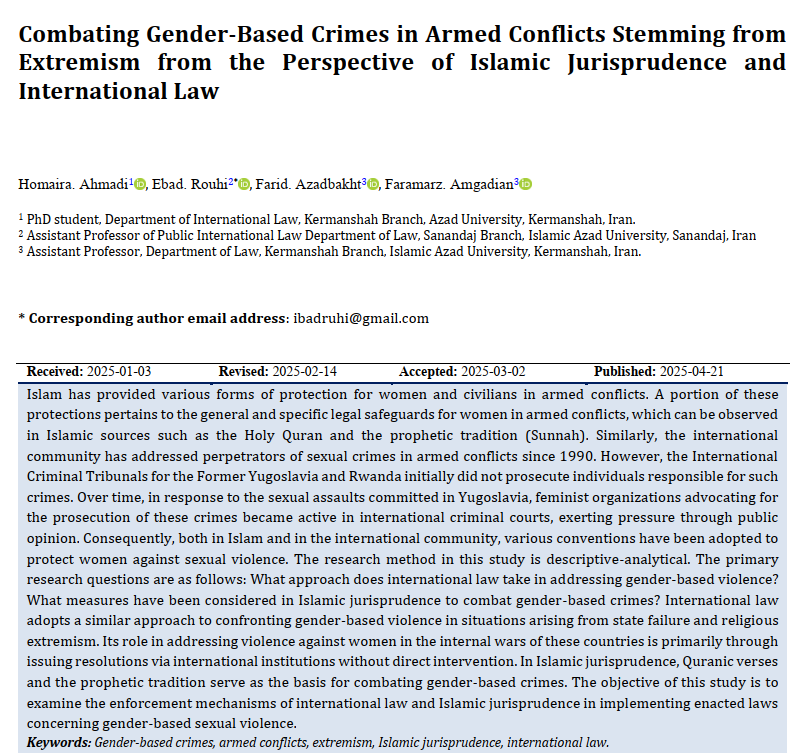Combating Gender-Based Crimes in Armed Conflicts Stemming from Extremism from the Perspective of Islamic Jurisprudence and International Law
Keywords:
Gender-based crimes, armed conflicts, extremism, Islamic jurisprudence, international lawAbstract
Islam has provided various forms of protection for women and civilians in armed conflicts. A portion of these protections pertains to the general and specific legal safeguards for women in armed conflicts, which can be observed in Islamic sources such as the Holy Quran and the prophetic tradition (Sunnah). Similarly, the international community has addressed perpetrators of sexual crimes in armed conflicts since 1990. However, the International Criminal Tribunals for the Former Yugoslavia and Rwanda initially did not prosecute individuals responsible for such crimes. Over time, in response to the sexual assaults committed in Yugoslavia, feminist organizations advocating for the prosecution of these crimes became active in international criminal courts, exerting pressure through public opinion. Consequently, both in Islam and in the international community, various conventions have been adopted to protect women against sexual violence. The research method in this study is descriptive-analytical. The primary research questions are as follows: What approach does international law take in addressing gender-based violence? What measures have been considered in Islamic jurisprudence to combat gender-based crimes? International law adopts a similar approach to confronting gender-based violence in situations arising from state failure and religious extremism. Its role in addressing violence against women in the internal wars of these countries is primarily through issuing resolutions via international institutions without direct intervention. In Islamic jurisprudence, Quranic verses and the prophetic tradition serve as the basis for combating gender-based crimes. The objective of this study is to examine the enforcement mechanisms of international law and Islamic jurisprudence in implementing enacted laws concerning gender-based sexual violence.
Downloads
References
Amidi Zanjani, A. A. (2022). Essentials of Political Jurisprudence, Volume 5, 2nd Edition. Majd Publishing.
Barqi, A. J. f. A. i. M. i. K. (1992). Al-Mahasin, Volume 2, 2nd Edition. Dar al-Kutub al-Islamiyyah.
Declaration on the elimination of violence against women. (1994).
Ebadi, S. (2018). History and Documents of Human Rights in Iran, 2nd Edition. Roshangaran Publishing.
Fazeli, D. (2019). Alternative Sentencing to Imprisonment: A Public Legal Awareness Program in the Shakardara District. https://moj.gov.af/sites/default/files/2019-08/dlawa1397agahi%20hoqiqi.pdf
Garshasbi, R., & Karimi Malh, A. (2018). ISIS Children: From Internalization of Takfiri Attitudes to Externalization of Coercive Behavior. Quarterly Journal of Political Research in the Islamic World, 8(1).
Haqshenas, A. M. (2012). Contemporary Hazara English-Persian Dictionary. Contemporary Culture Publishing.
Hilli, A. H. i. Y. i. M. A. (1985). Tadhkirah al-Fuqaha, Volume 9. Al-Bayt Institute.
Hosseini, M. M. (2018). Violence Against Women in Afghanistan from the Perspective of Domestic and International Law Faculty of Law, Qom University].
Hurr Amili, M. i. H. (1980). Wasail al-Shi'a ila Tahsil Masail al-Shari'ah, Volume 11. Al-Bayt Institute for Reviving Heritage.
Hurr Amili, M. i. H. (1984). Hidayat al-Ummah ila Ahkam al-A'immah, Volume 5. Islamic Research Center.
Ibn Athir, I. a.-D. A. (1965). Al-Kamil. Dar al-Sader.
Ibn Hisham, a.-H. (1988). Al-Sirah al-Nabawiyyah, Volume 2. Dar al-Ma'rifah.
Ihsai, I. A. J. M. i. A. (1984). Al-Awali al-Li'ali al-Aziziyyah, Volume 1. Dar al-Sayyid al-Shuhada Publishing.
Karamzadi, M. (2016). Jihadist-Takfiri Salafism and the Future of Political Stability in the Middle East. Quarterly Journal of Political Research in the Islamic World, 6(1).
Karbasi, M. M. (2002). The Nature of Crime in Jurisprudence and Penal Law. Quarterly Journal of Knowledge(58).
Khomeini, S. R. (1999). Tahrir al-Wasilah, translated by Islami, Ali, Volume 4. Islamic Publications Office.
Khomeini, S. R. (2009). Course on the Philosophy of Law. Imam Khomeini Educational and Research Institute.
Kulayni, M. i. Y. q. (1978). Al-Kafi, Volume 5. Dar al-Kutub al-Islamiyyah.
Majlisi, M. B. (1984). Bihar al-Anwar, Volume 21. Dar al-Kutub al-Islamiyyah.
Mehrpour, H. (2018). International Human Rights System, 8th Edition. Information Publishing.
Moradkhani, S. (2021). Criminology of Violence Against Women in International Law Faculty of Humanities, Payame Noor University, Dezful Unit].
Najafi, M. H. i. B. i. A. a.-R. (1980). Jawahir al-Kalam fi Sharh al-Islam fi Masail al-Halal wa al-Haram, Volume 21, 7th Edition. Dar al-Ahya al-Turath al-Arabi.
Nour Mohammadi, M. S. (2012). Criminal Policy of Afghanistan Regarding Victimization of Women. Journal of Legal Advancement, 4(16 and 17).
Radmehr, F., & Turshizi, L. (2019). Crimes Against Women in International Criminal Law. Journal of Jurisprudence, Law, and Criminal Sciences, 5(15), 1-13.
Raee, M. (2012). Human Rights and Supervisory Mechanisms in International Documents and Jurisprudence. Journal of Public Law Ideas, 1(3), 5-28.
Rahgoshay, H. (2016). The Role of State Intervention in Domestic Violence Against Women from a Human Rights Perspective. Quarterly Journal of Women's Rights Protection Studies(4).
Salehi, J. (2016). The Judicial Practice of International Criminal Courts in Addressing Sexual Crimes Against Girl Soldiers. Scientific-Research Quarterly Journal of Social Welfare, 16(61), 9-46.
Tusi, M. i. H. (2008). Al-Mabsut fi Fiqh al-Imamiyyah, Volume 2, 3rd Edition. Al-Maktabah al-Murtazawiyyah for Reviving Ja'fari Works.
Universal Declaration of Human Rights. (2018). https://www.ekhtebar.ir/
Waqidi, M. i. U. (1988). Al-Maghazi, Volumes 1 and 2. Al-Alami Institute.
Zuhayli, W. (1983). Effects of War in Islamic Jurisprudence, 4th Edition. Dar al-Fikr.

Downloads
Additional Files
Published
Submitted
Revised
Accepted
Issue
Section
License
Copyright (c) 2025 Homaira Ahmadi, Ebad Rouhi, Farid Azadbakht, Faramarz Amgadian (Author)

This work is licensed under a Creative Commons Attribution-NonCommercial 4.0 International License.





